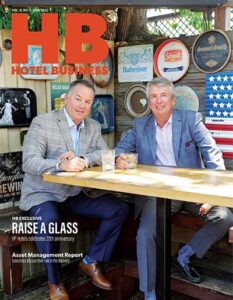As the industry continues on the path to recovery, asset management companies are doing their best to make sure hotel owners are on the right side of the ledger. It certainly hasn’t been easy due to the challenges hotels are facing. Hotel Business caught up with Matthew Arrants, principal, The Arrants Company and president, Hospitality Asset Managers Association (HAMA); Chris Hague, COO, Hotel Asset Value Enhancement Inc. (hotelAVE); and Gary Isenberg, president, LWHA Asset Management Group, to get their take on how their portfolios are currently performing, as well as the importance of their role in the industry.
—Adam Perkowsky
How is 2022 shaping up so far vs. your forecast at the beginning of the year?
Arrants: First, it’s important to note that my properties are primarily in leisure destinations. Overall, things are better than expected, but it has varied a bit by segment—transient leisure continues to be very strong, as does social group. Corporate group experienced some drop-off at the beginning of the year with the Omicron surge. It has since recovered; however, we are watching the most recent surge carefully. I continue to pretend to amateur epidemiologist. In addition to Omicron, the War in Ukraine has impacted leisure demand at my luxury hotels as fewer people are traveling to Europe. Hague: Better than expected for the vast majority of our portfolio. Ironically, the hotels that worked hard to secure 2022 budget approvals early did not have the benefit of anticipating Omicron impact, so those hotels generally suffered in January/February relative to budget. However, most have rebounded strongly through March and April as we are experiencing better-than-anticipated business transient and group conversion. Resorts continue to drive the revenue premiums with flow, but we are seeing exceptional operational flex and flow efforts throughout our urban and suburban portfolio as well.
Isenberg: Occupancy is in line with forecast; however, our initial ADR projections are being exceeded by $10 on average, and our forecast for the remainder of 2022 reflects the increased ADR, as we expect this trend to carry through the year. Regarding demand, the impact from the Omicron variant, while material, was briefer than expected at the start of the year, which led early 2022 occupancy to exceed our expectations. Occupancy levels are now operating consistently with our initial forecasted expectations.
What are the biggest challenges hotels are facing at this time?
Arrants: Labor, labor, labor. Things are not as bad as they were last summer, but they are still very tough. As an asset manager, I’m typically focused on dollars and cents. Now, I’m very interested in morale and corporate culture at my properties. I assume that we are at or above market in terms of pay rates, but in addition to that, we need to be sure that the employees are happy. That means manageable hours, good cafeteria food and a fun and healthy work environment.
Hague: Besides the obvious labor concerns, supply chain issues have also been a challenge for many industries. Depending on the hotel, the supply chain issues have ranged from a modest nuisance to major critical path disruptions with meaningful revenue implications. Operationally, we have been able to pivot to different suppliers/products for the most part, but the challenge has been much more disruptive for large-scale renovation projects, which rely on specialized equipment and critical components with fewer alternatives. Guest expectations have returned, which are driving the return of brand standards that have been relaxed through the pandemic. This will exacerbate existing labor challenges, and hamper margin growth temporarily. These operational standards are likely to be followed by the return of facility standards, which will be difficult to fully address with grossly underfunded FF&E reserves due to significantly reduced contributions over the last couple of years.
Isenberg: Labor continues to be a major issue—both in terms of finding and retaining employees, as well as significant increases in wages. We oversee many select-service hotels in suburban markets, and many of them have increased their housekeeping wages significantly. Today, all of our hotels are above $14 per hour; some were sub-$10 prior to COVID. The increased labor costs, along with soaring inflation and continued supply chain issues, are raising concerns about the ability to maintain profit margins and cash flow.
How important is the role of asset managers at this point in the recovery?
Arrants: Asset managers have become critical, not because of where we are in the recovery but because of the lack of alignment between owners and operators. Because most of the management company fees are derived from top-line revenues, they are not incentivized to drive profitability. At the same time, they need to focus on building their brands and increasing their profitability. This can sometimes be seen in excessive capital budget requests or the charging for services that were once included as part of the base management fee.
Hague: The ROI for hotel asset management has grown significantly given the destabilized nature of the industry. Owners require a much more proactive and creative approach to overcome the headwinds I noted earlier and capitalize on current guest-driven tailwinds. The post-COVID playbook is far more dynamic, and asset management’s proactive approach is resulting in outsized gains among the competition.
Isenberg: Asset management is always important, both in a soaring economy and a faltering one. Good asset manager practices provide ownership with data to improve financial performance. In a soaring economy, these practices can identify revenue opportunities to maximize profitable business channels and reduce high-cost business sources. As revenues soar, so do expenses; good asset management can eliminate the amenity/expense creep. In an ailing economy, asset managers assist greatly in curtailing expenses by improved expense control, identifying less expensive alternatives and implementing value-added processes and practices. A good asset manager will also identify additional revenue opportunities; in many instances, channels or segments that were not attractive or profitable in a soaring economy become the darlings in a stalling one, such as OTAs, airlines and tours, to name a few. Early adopters to this change in business sourcing benefit greatly. Good asset management practices will identify the downward trend early, enabling management to implement a business sourcing strategy shift before the competition. The early bird gets the worm.




